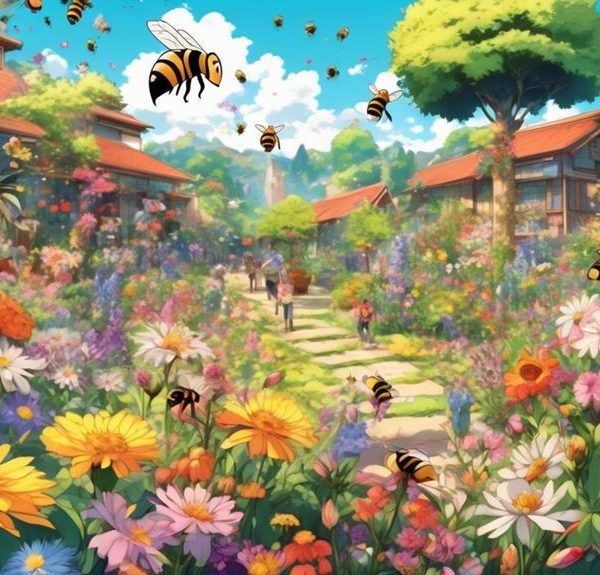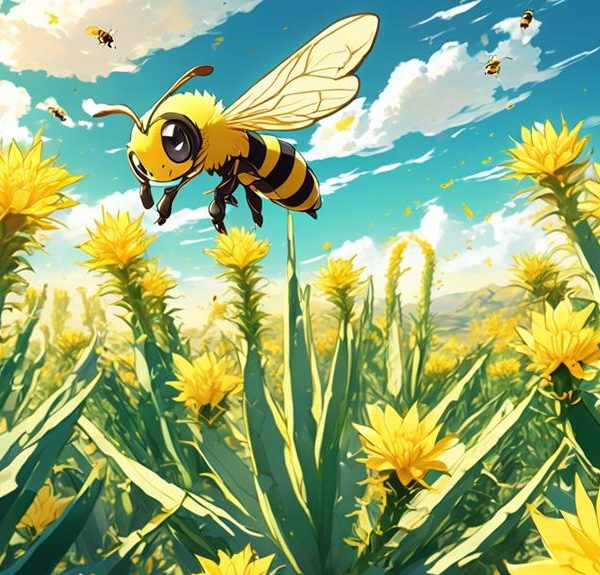Get the buzz on whether bees are truly attracted to allium flowers and uncover the complex factors influencing this intriguing relationship.
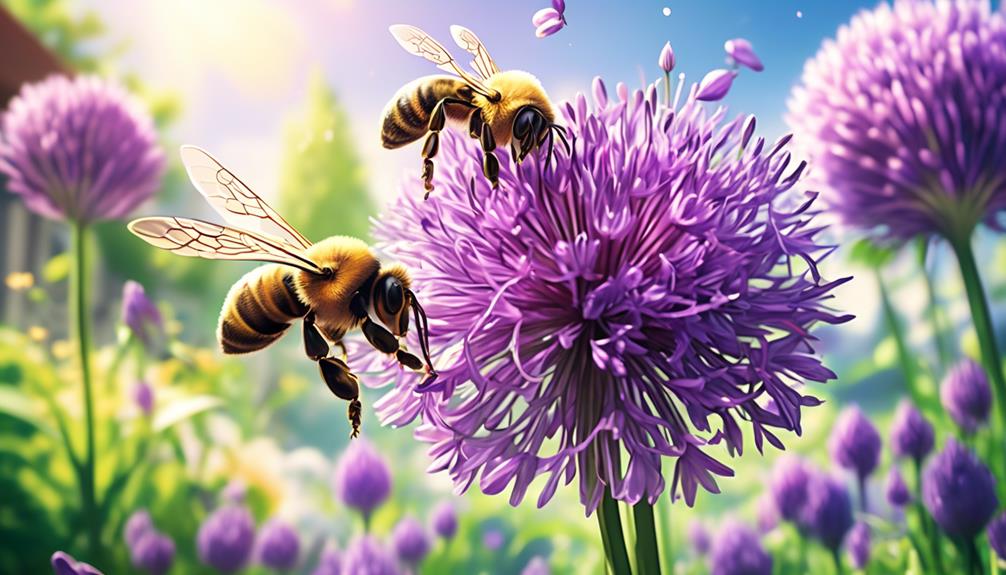
Do Bees Like Allium Flowers?
You've likely heard the theory that bees are attracted to allium flowers, but have you ever stopped to consider whether this is actually true?
Many factors can influence a bee's attraction to certain flowers, including color, scent, and the availability of nectar and pollen.
Alliums, with their vibrant hues and striking spherical blooms, certainly seem like they'd be a bee magnet. But is this really the case, or is it simply a myth?
As you explore this topic, you'll be challenging your preconceptions and deepening your understanding of the complex relationships in the natural world.
There's more to this story than meets the eye.
Key Takeaways
- Allium flowers are attractive to bees due to their high pollen and nectar content.
- Bees are particularly drawn to purple or blue flowers, like most alliums.
- Alliums offer an easy landing platform and plentiful food source for bees.
- Planting a diverse range of alliums can attract bees for a longer blooming period.
Understanding Allium Flowers
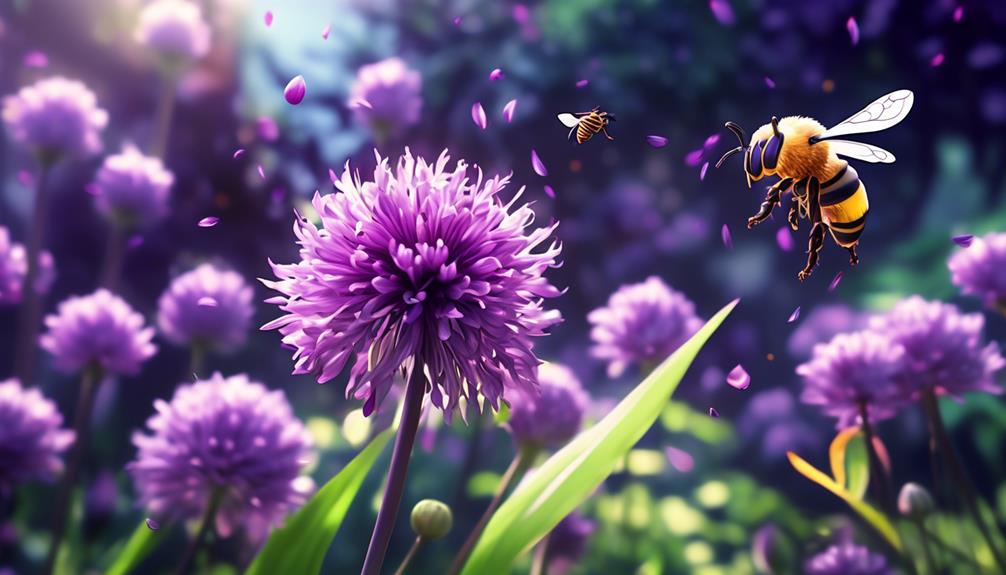
Before diving into the relationship between bees and allium flowers, it's essential to understand what allium flowers are and what they bring to the table. Allium flowers, part of the Allium genus, are a broad family of plants that include onions, garlic, and leeks. But we're focusing on the ornamental types that are often grown for their stunning spherical blooms. They're known for their hardy nature and easy care, making them a favorite among gardeners.
You'll find alliums in a wide variety of colors, sizes, and blooming times. They generally bloom in late spring to early summer, providing a splash of color when many other plants are just starting to grow. But it's not just their beauty that's noteworthy. Allium flowers are also known for their distinctive, pungent aroma. You might think this would deter bees, but quite the opposite is true. It's this smell that actually attracts bees, making alliums an excellent choice for those looking to create a bee-friendly garden.
The Bee-Flower Relationship
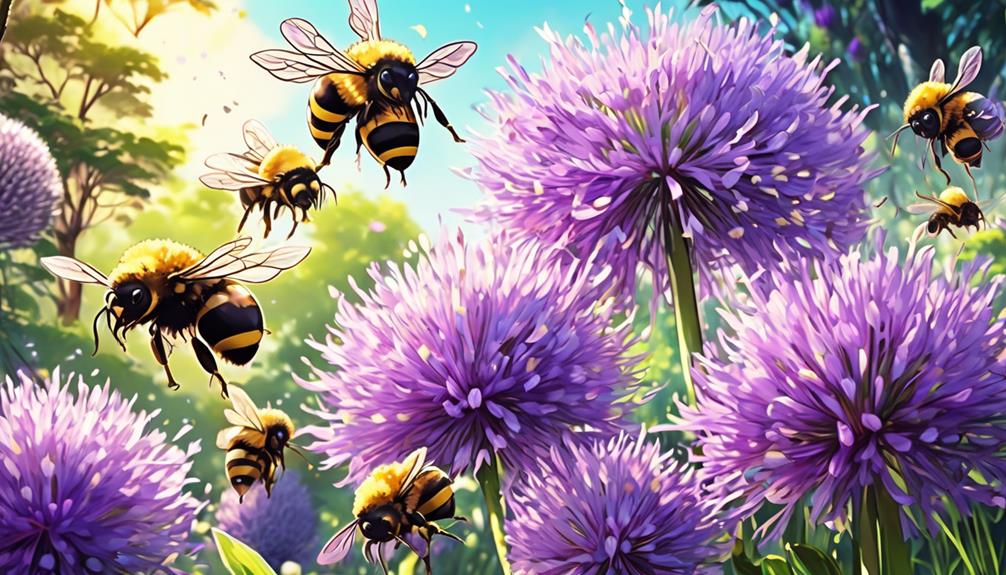
Understanding the bee-flower relationship is essential, as it's a remarkable symbiosis that significantly impacts our ecosystem and food supply. Bees need flowers for their nutritional needs, primarily nectar and pollen. In return, they perform a critical role in the plant's reproductive process – pollination.
Bees, being excellent pollinators, visit flowers to collect nectar and pollen. As they do this, they inadvertently transfer pollen from the male parts of a flower (stamens) to the female parts (pistils). This process, known as cross-pollination, enables plants to produce fruit and seeds.
Your garden's allure to bees can increase with the right mix of flowering plants. Alliums, for instance, are particularly attractive to bees due to their high pollen and nectar content. This makes them an excellent choice if you're aiming to support your local bee population.
Alliums: A Bee's Favorite?
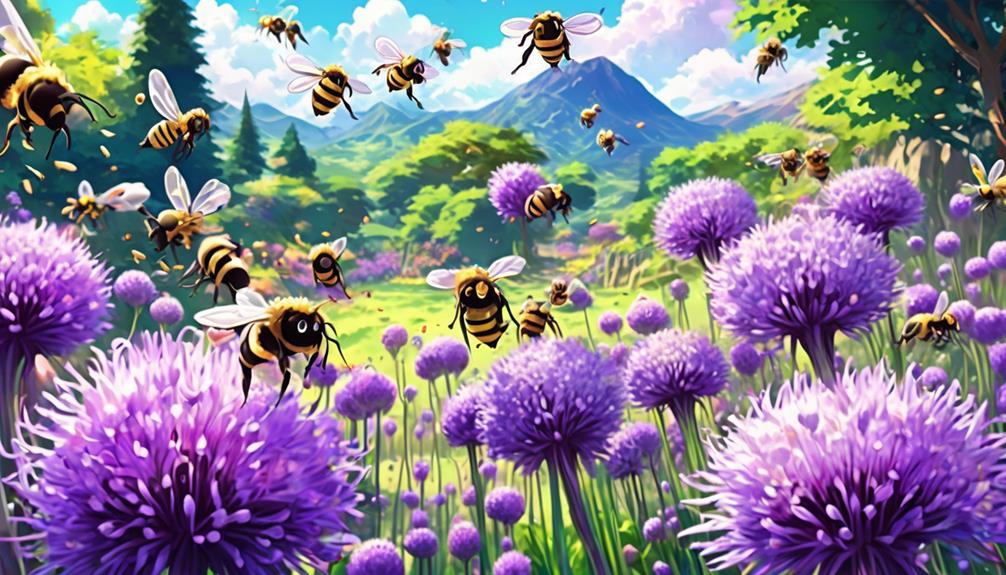
So, you might be wondering why alliums are a favorite among bees. Here's the buzz.
Alliums, also known as ornamental onions, are a hit with bees due to their nectar-rich, wide-open flowers. They offer an easy landing platform and a plentiful food source, making them an irresistible destination for these industrious insects.
Research shows that bees are particularly drawn to flowers that are purple or blue, just like most alliums. Their compound eyes can distinguish these colors easily, using them as visual cues to locate nectar. Alliums also emit a distinct, onion-like scent that bees find appealing, assisting them in their search for food sources.
Furthermore, allium flowers bloom in late spring and early summer, a time when bees are most active. This synchronicity means that when bees are on the hunt for nectar, alliums are in full bloom, ready to offer their sweet reward.
Nectar and Pollen Production
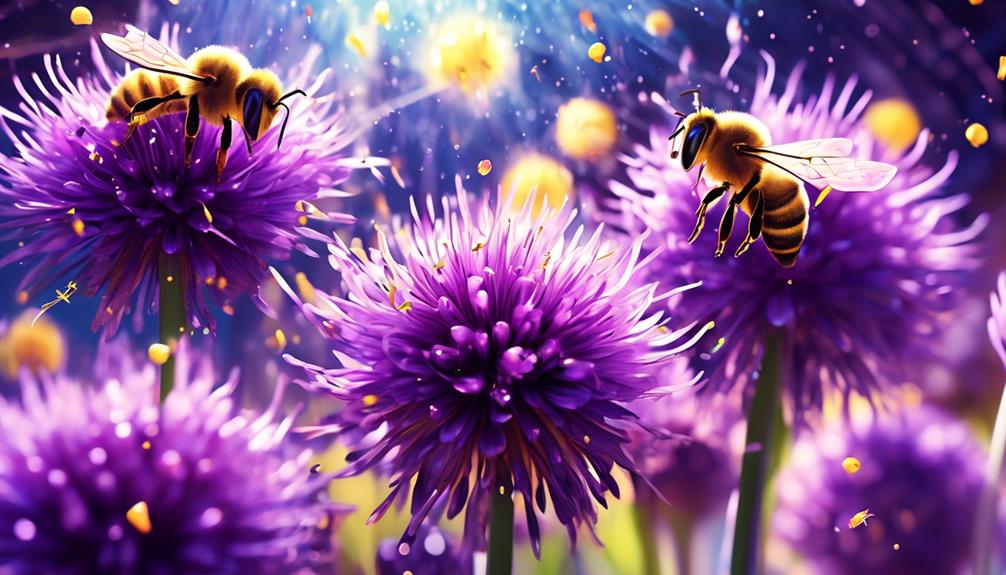
While you may know that alliums are beloved by bees, it's their high nectar and pollen production that truly makes them a bee magnet. Alliums produce large amounts of nectar, a sweet liquid that bees use for energy. Pollen, on the other hand, provides bees with protein, which is essential for their growth and development.
Research shows that the nectar of allium flowers contains high sugar concentrations, making them particularly attractive to bees. They're like a fast food joint for bees, offering a quick energy boost. Plus, the unique spherical shape of allium flowers provides a large surface area for bees to collect pollen, making their visit even more rewarding.
Moreover, alliums are prolific bloomers. They produce flowers in abundance, ensuring a consistent source of nectar and pollen for bees throughout their blooming period. This is particularly beneficial during early summer when other food sources may be scarce.
Allium Varieties and Bee Attraction
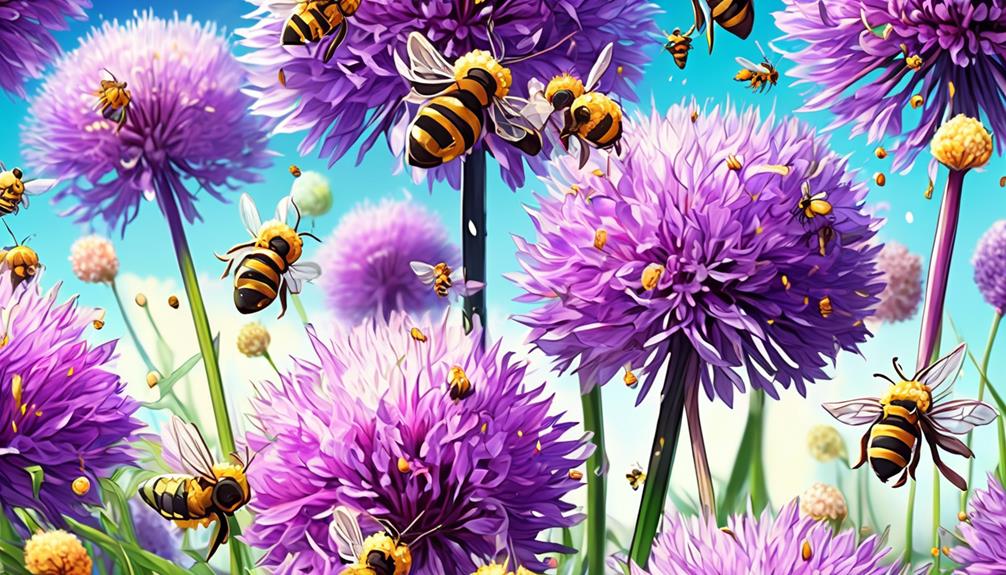
Not all alliums are created equal when it comes to attracting bees; certain varieties have proven to be more enticing than others due to differences in their nectar and pollen production.
For instance, Allium sphaerocephalon, also known as the drumstick allium, is a big hit with bees. It's a hardy, easy-to-grow variety that produces an abundance of nectar, making it a veritable buffet for your buzzing friends.
In contrast, Allium giganteum, or the giant allium, isn't as popular with bees despite its impressive size. While it's a stunning addition to any garden, it doesn't produce as much nectar, so bees tend to overlook it.
The Allium 'Purple Sensation', on the other hand, strikes a happy medium. It's a prolific nectar producer and its vibrant, purple blooms are visually appealing to bees. They're also a common sight in late spring, providing an important food source for bees when other plants aren't in bloom.
Enhancing Bee Populations With Alliums
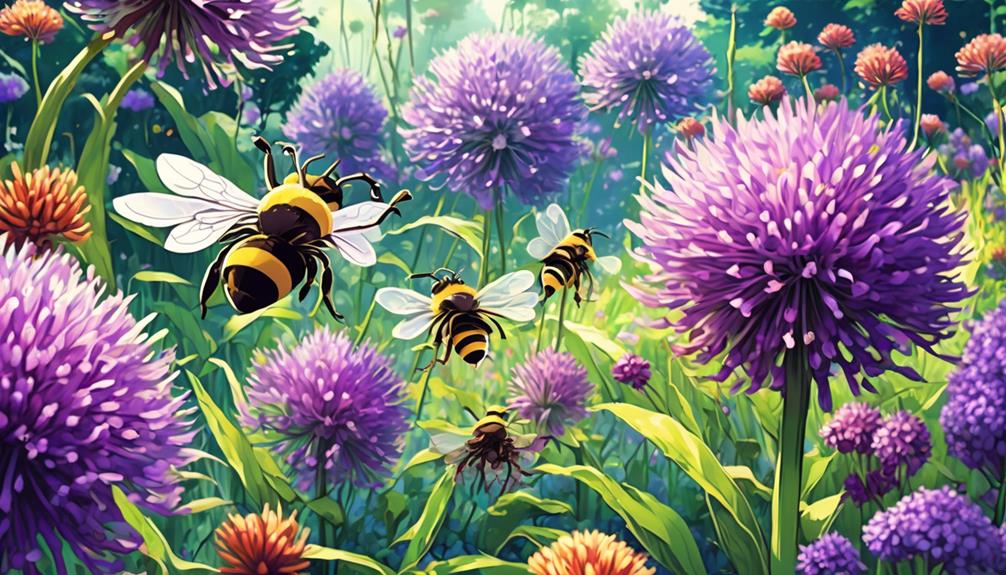
Understanding the specific varieties of alliums that attract bees is just the first step; you can further harness these flowers to significantly boost local bee populations in your garden. Start by planting a diverse range of alliums, ensuring a longer blooming window. This offers bees a consistent food source. Researchers at the University of Bristol found that bees prefer gardens with a wide variety of flowers.
Ensure to plant your alliums in sunny areas as bees are most active in sunlight. Avoid using pesticides, they're harmful to bees. Instead, opt for organic gardening methods. The Xerces Society encourages the use of compost and mulch to naturally deter pests.
Interplant alliums with other bee-friendly flowers, creating a landscape that's an irresistible buffet for bees. The University of Sussex research showed that bees are attracted to gardens with mixed planting.
Frequently Asked Questions
What Other Types of Flowers Are Popular Among Bees Besides Allium Flowers?"
You're curious about which flowers bees prefer, aside from Alliums. Well, they're quite fond of several types!
Lavender is a favourite because of its rich nectar.
Marigolds and sunflowers also attract bees with their bright colors and plentiful pollen.
Don't overlook herbs like mint and sage which bees enjoy too.
Lastly, native wildflowers in your area are a safe bet, as they've co-evolved with local bee species.
How Can One Maintain a Healthy Allium Flower Garden?"
Maintaining a healthy allium garden isn't too hard. You've got to ensure well-draining soil and full sun exposure.
Plant bulbs about 3 times as deep as the height of the bulb.
Water them regularly, but don't overwater. They don't need much feeding, a slow-release granular fertilizer in spring will do.
Watch for pests and diseases. Trim dead foliage, but not before it's completely died back.
That's it! You're on your way to a thriving allium garden.
What Are the Potential Impacts of Bees Disappearing on Allium Flower Populations?"
If bees disappear, your allium flower populations could seriously suffer. Bees are primary pollinators and without them, allium's cross-pollination is hindered. This could lead to a decrease in flower diversity and productivity.
It's not just about aesthetics, though. A decline in allium flowers can impact ecosystems that rely on them. So, you see, protecting bees isn't just good for them, it's vital for your alliums and overall biodiversity.
Are There Any Specific Pests or Diseases That Affect Allium Flowers Which Can Indirectly Affect Bees?"
Yes, there are specific pests and diseases that can affect Allium flowers, which in turn, might impact bees. Onion thrips, Allium leaf miners, and diseases like white rot can harm Alliums.
If these flowers become less healthy or abundant, bees might have less access to their nectar. So, indirectly, your bee population could be affected.
It's a good idea to monitor your Alliums for signs of these pests and diseases.
Do Other Pollinators, Like Butterflies or Hummingbirds, Also Get Attracted to Allium Flowers?"
Yes, other pollinators like butterflies and hummingbirds do get attracted to Allium flowers. It's not just bees that love these plants.
The vibrant colors and sweet nectar of Alliums lure a wide variety of pollinators. Butterflies, in particular, find them irresistible due to their flat-topped clusters, which make landing and feeding easier.
Hummingbirds, too, enjoy their nectar, so you'll be helping a range of wildlife by planting Alliums.
Conclusion
So, do bees like allium flowers? You bet they do! Bees can't resist the nectar and pollen alliums produce. Various allium varieties offer a feast for these essential pollinators. By planting alliums in your garden, you're not just adding color and beauty, but also supporting bee populations.
So go ahead, make your garden a bee paradise with these stunning, bee-friendly blooms. After all, a thriving garden needs bees, and bees need flowers like alliums.

